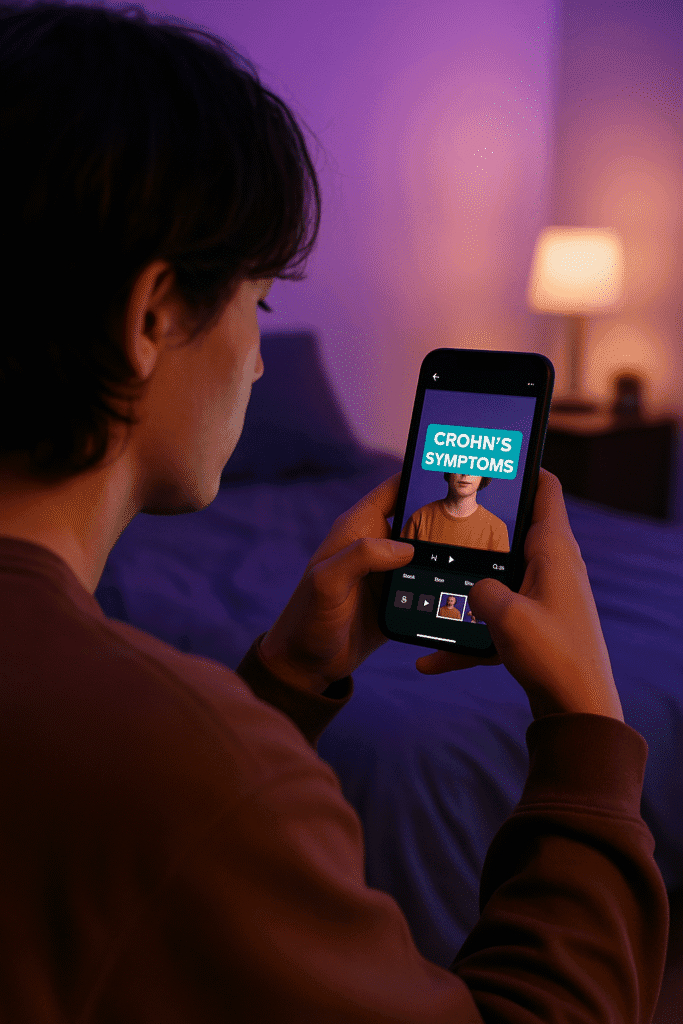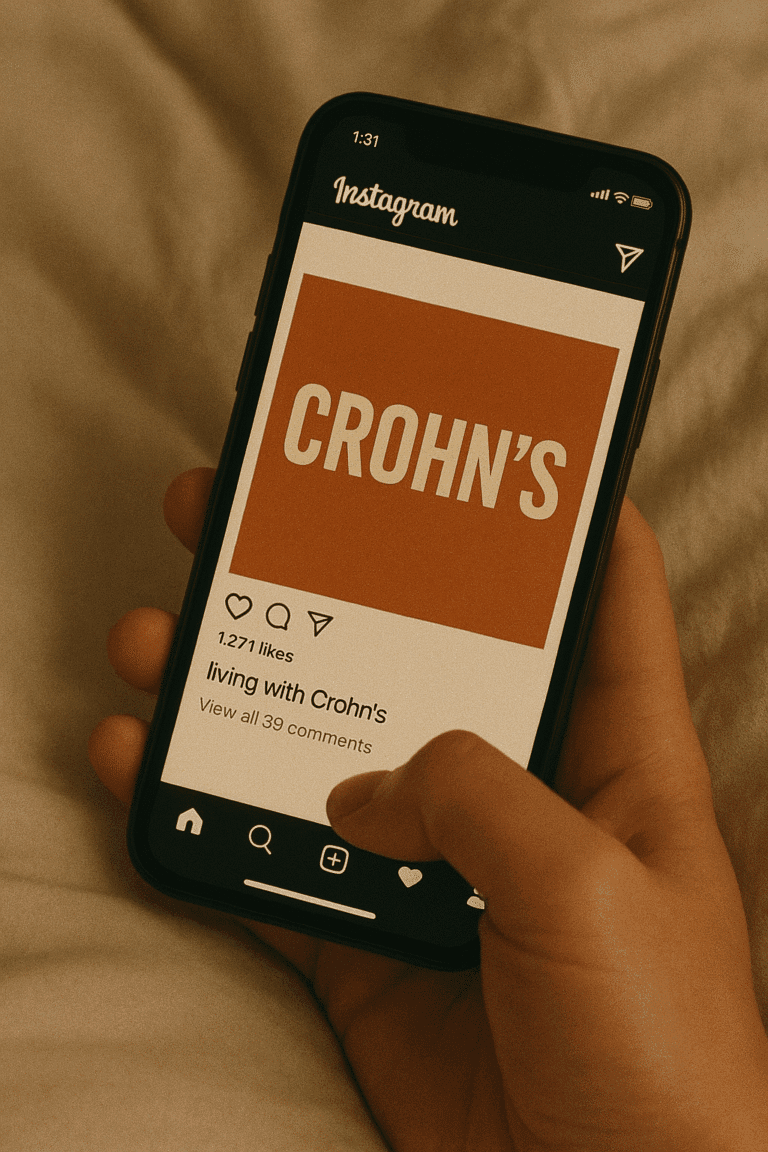“I don’t have a six-pack or a smoothie sponsor. I have Crohn’s, lived experience, and a knack for oversharing. Turns out, that’s what people trust.” Health advice used to come from doctors or fitness influencers. But trust is shifting. People are turning to Crohn’s patient stories — raw, real, and grounded in lived experience — for honest health insight they can actually use.
Health advice used to come from doctors or fitness influencers. But trust is shifting. People are turning to Crohn’s patient stories — raw, real, and grounded in lived experience — for honest health insight they can actually use. If you’re living with Crohn’s, you’ve probably noticed how invisible it feels. Everyone’s talking about gut health until it gets graphic. Then suddenly, it’s back to green juices and gratitude journaling.
The answer is Crohn’s patient stories. Real people. Real symptoms. No filters. Just lived experience that speaks to what it’s actually like.
Why Crohn’s Patient Stories Build Trust
Why do we trust Crohn’s patient stories?
When someone risks embarrassment to tell their truth, it matters. Vulnerability has weight. Sharing the rough edges builds credibility that glossy content never will.
- Costly Signalling Theory tells us that when someone risks embarrassment or discomfort to share their truth, it means something. Vulnerability is expensive. That’s why it carries weight.
- Truth Bias makes us more likely to believe people who admit flaws. The more someone shares the awkward, the more we trust the awesome.
- Parasocial Trust builds when we see someone regularly being themselves online. It tricks the brain into thinking we know them. The effect is real — even if the relationship is one-way.
Compare this to the curated perfection of typical wellness influencers. One has IBS-inspired memes and colonoscopy prep reels. The other has a ring light and a vague quote about healing. Who feels more human?
From Flare-Ups to Credibility
You’ve probably shared a hospital photo or ranted on Reddit about bowel prep gone wrong. What felt like oversharing might actually be outreach. Your worst moments might be someone else’s lifeline.
Your Crohn’s patient story isn’t content. It’s connection.
Think about it:
- The moments you thought were too much — managing a flare on a first date, arguing with a toilet queue — are exactly what others connect with.
- You’re not pretending to be perfect. You’re proving you survived.
- Instead of offering solutions, you’re offering understanding. That’s rarer — and arguably more valuable.
Why the Crohn’s Patient Voice Is Leading Health Conversations
There’s a battle going on: the expert on a pedestal vs the patient on the sofa. And patients are winning.
Glossy influencer advice feels like it’s written in a parallel universe. Patient advice is messy, emotionally charged, and full of context — which makes it usable.
Cast yourself as the friend who’s been through it — not the expert, not the brand ambassador, just someone who’s lived it and is willing to talk.
As audiences wise up, brands will move towards patient influencers who bring empathy, not ego.
This isn’t anti-expert. It’s about lived expertise — the kind you’ve earned through hospital beds, missed meals, and stubborn resilience.

How to Share Crohn’s Patient Stories Authentically
You don’t need 10,000 followers or a fancy ring light. Start where you are, with what you’ve lived.
Here’s how:
1. Choose your platform
- Instagram Reels for daily realities, humour, and face-to-camera storytelling
- TikTok for quick insights, real-time reactions, or even character skits (Colonoscopy Karen, anyone?)
- Twitter threads for structured storytelling or mini-rants
- Blog posts or newsletters for deeper dives and emotional processing
2. Choose your truth corner
Pick the part of your life that you’re ready to share — not everything, just something. Examples:
- “This Week’s Flare Rating”
- “What Worked For Me Wednesday”
- “Hospital Bag Reviews”
- “Toilet Proximity Planning”
These formats build recognition, reduce decision fatigue, and let you pace your energy.
3. Bring in your voice
Use humour. Use honesty. Use rage. Use metaphors. Use whatever tone feels like you on a low-symptom day. The goal isn’t to win sympathy — it’s to build connection.
4. Influence isn’t about products
Influence means making someone feel seen. Crohn’s patient stories do that better than any protein shake ever could.
Crohn’s Patient Storytelling in Action
Let’s take a look at how people are already flipping the script:
- @healthyhappygab_ – Empowering, body-positive Instagram posts about life with Crohn’s and an ileostomy, plus practical tips and honest reflections
- @rvanvoorhis – Crohn’s disease and ostomy advocate sharing cooking, lifestyle, and advocacy content with humour and heart
- @sammmreid – Candid, supportive, and relatable Crohn’s journey updates, focusing on mental health and daily life
- Reddit’s r/CrohnsDisease – Possibly the most emotionally literate corner of the internet, with real-time stories and peer support
What matters most isn’t lighting or video edits. It’s honesty, frequency, and how much your story feels real.
Why Crohn’s Patient Stories Matter in Today’s Health Content
In a sea of content fatigue, Crohn’s patient stories cut through with credibility and care. They create a shortcut to trust, empathy, and emotional relevance. People living with Crohn’s disease are in a unique position — not because they chose it, but because they’ve survived it.
You don’t owe anyone your story. But if you decide to share it, know this…
- It could help someone who’s newly diagnosed and terrified.
- It could challenge lazy narratives about what chronic illness looks like.
- It could influence how healthcare providers think about lived experience.
Most of all, it could remind you that your experience has value — not just in private, but in public too.

Straight Answers to Common Questions About Crohn’s Patient Stories
They’re grounded in lived experience, offering honesty, practical insight, and emotional connection that polished advice often lacks.
Pick a platform you enjoy, choose one part of your story to start with, and post consistently. Humour and honesty help you build trust.
They are. As audiences shift toward authentic voices, patient influencers are becoming key sources of support and trust — especially in chronic illness communities.
No. Impact comes from relatability and consistency, not numbers. A single story that helps someone feel seen is influence in action.
Those raw, emotional or even graphic stories? They’re often the most helpful for others going through it — if sharing feels right for you.





